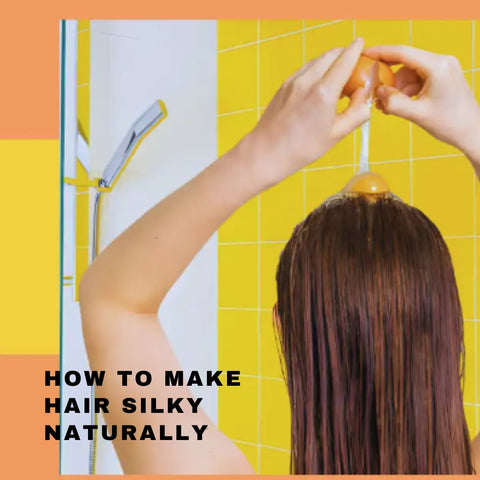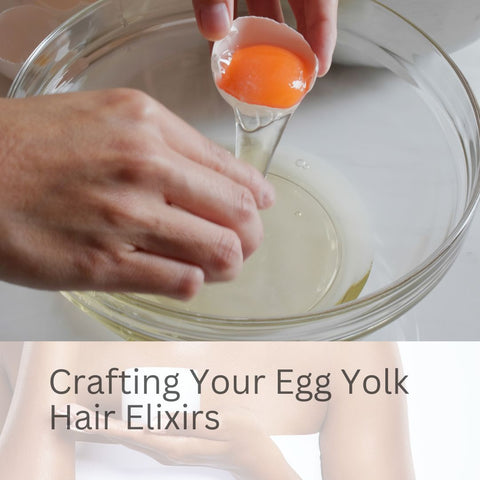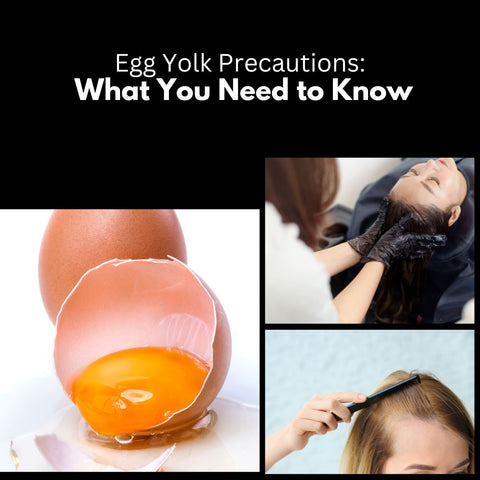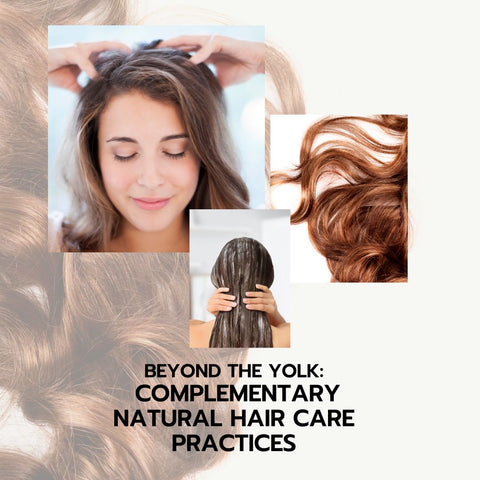The humble egg yolk has served as an unsung hero in hair care. Nutrient-rich and easily obtainable, it has gained popularity as a natural remedy for a range of hair problems. This golden ingredient is well-known in both contemporary hair care discussions and traditional home remedies, making it a must-have for anyone looking for healthier hair.
The Science of Egg Yolk: Nutritional Powerhouse for Hair

Essential proteins, fatty acids, vitamins, and minerals are the basic building blocks for hair health. The proteins and biotin in egg yolk significantly strengthen hair, while the fatty acids add moisture. Furthermore, vitamins and minerals are essential for overall scalp and hair health. Although there is a mix of anecdotal and scientific evidence, studies have shown that the ingredients in egg yolk can help with hair growth and texture, making them an important addition to your diet for maintaining healthy hair.
Protein-Rich Yolks: Building Blocks for Strong Hair
Egg yolks are high in protein, notably keratin, which is the primary structural component of hair. Egg yolks can provide your body with the building blocks it needs to grow strong and healthy hair. Egg yolks also include biotin and other critical vitamins and minerals that improve overall hair health by fostering shine and durability. For optimal hair strength and growth, you should balance your diet with a mix of protein sources and other nutrients.
Vitamins and Minerals: The Essentials for Hair Health
Several vitamins and minerals are important for maintaining healthy hair:
-
Biotin (Vitamin B7): Biotin is necessary for hair growth and scalp health. It strengthens the hair follicles and reduces hair breakage.
-
Vitamin A: This vitamin promotes the production of sebum, a natural oil that moisturises the scalp and keeps hair healthy. It also helps to grow and repair tissues, such as hair follicles.
-
Vitamin E: As a powerful antioxidant, vitamin E aids in the repair of damaged hair follicles and increases blood circulation to the scalp, promoting hair growth.
-
Vitamin C: Vitamin C promotes collagen production, which is essential for hair strength. It also aids in the absorption of iron, another nutrient essential for hair health.
-
Vitamin D: Vitamin D is required for hair follicle cycling, and deficiency has been linked to hair loss.
-
Iron: Iron is required for the production of haemoglobin, which transports oxygen to the hair follicles. Iron deficiency can cause hair thinning and loss.
-
Zinc: Zinc contributes to the growth and repair of hair tissue. It also helps to keep the oil-secreting glands attached to hair follicles functioning properly, preventing hair from becoming dry and brittle.
-
Omega-3 Fatty Acids: These essential fatty acids keep the scalp hydrated and promote hair growth. They also have anti-inflammatory properties that may help prevent hair loss.
-
Protein: Protein is the building block of hair. Consuming an adequate amount of protein ensures that your body has enough amino acids to build and repair hair follicles.
Moisture Magic: Egg Yolk’s Hydrating Benefits
Egg yolks do provide excellent hydrating benefits for the hair. They are high in fats and proteins, which can help moisturise and nourish dry and brittle hair, making it soft, shiny, and easier to manage. Here's how egg yolks create moisture:
-
Fatty Acids: Egg yolks contain fats, including omega-3 fatty acids, which can aid in hair hydration and moisture retention. These fatty acids also improve the overall health and shine of your hair.
-
Proteins: Egg yolks contain protein, specifically keratin, which can help strengthen and repair damaged hair. This protein strengthens the hair strands, making them less prone to breakage and split ends.
-
Vitamins and minerals: Egg yolks contain vitamins and minerals that promote hair health, such as vitamin A, vitamin E, and biotin. These nutrients nourish the scalp and hair follicles, resulting in healthier hair growth and better moisture retention.
To use egg yolks as a hydrating hair treatment, make a simple DIY hair mask by combining them with other natural ingredients like honey, olive oil, or yoghurt. Apply the solution to clean, damp hair, concentrating on the ends and avoiding the scalp. Leave the mask on for 20-30 minutes, then thoroughly rinse with lukewarm water. You can continue with your regular shampoo and conditioner routine.
Crafting Your Egg Yolk Hair Elixirs

Making your own egg yolk hair elixirs is a fun and effective way to nourish and moisturise your hair. Here are a few simple recipes to help you get started:
-
Basic Egg Yolk Hair Mask: Ingredients are 2 egg yolks and 2 tablespoons of olive oil or coconut oil. Whisk the egg yolks in a bowl until smooth. Add the olive oil or coconut oil to the egg yolks and mix well. Apply the mixture to clean, damp hair, focusing on the ends and avoiding the scalp. Leave the mask on for 20-30 minutes.
-
Egg Yolk and Honey Hair Mask: Ingredients are 2 egg yolks, 1 tablespoon of honey, and 1 tablespoon of plain yogurt (optional). Combine the egg yolks, honey, and yogurt in a bowl and mix until well blended. Apply the mixture to clean, damp hair, focusing on the lengths and ends. Leave the mask on for 20-30 minutes.
-
Egg Yolk and Avocado Hair Mask: Ingredients are 1 ripe avocado, 2 egg yolks, and 1 tablespoon of olive oil or argan oil. Mash the ripe avocado in a bowl until smooth. Add the egg yolks and olive oil or argan oil to the mashed avocado and mix well. Apply the mixture to clean, damp hair, focusing on the ends and avoiding the scalp. Leave the mask on for 20-30 minutes.
These egg yolk hair elixirs can help moisturise, nourish, and strengthen your hair, making it soft, shiny, and easier to manage. Always conduct a patch test on your hair before using any new ingredients, especially if you have allergies or sensitivities.
Simple Egg Yolk Hair Mask Recipes for Every Hair Type
Here are some simple egg yolk hair mask recipes tailored to different hair types:
-
Dry Hair: Combine 2 egg yolks, 1 tablespoon honey, and 1 tablespoon coconut oil. In a mixing bowl, combine the egg yolks and whisk until smooth. Mix in the honey and coconut oil until thoroughly combined. Apply the solution to clean, damp hair, concentrating on the ends and avoiding the scalp. Leave the mask on for 20 to 30 minutes.
-
Oily Hair: Ingredients are 2 egg yolks, 1 tablespoon of lemon juice, and 1 tablespoon of aloe vera gel. Whisk the egg yolks in a bowl until smooth. Add the lemon juice and aloe vera gel, and mix well. Apply the mixture to clean, damp hair, focusing on the lengths and avoiding the scalp. Leave the mask on for 20-30 minutes.
-
Normal Hair: Ingredients are 2 egg yolks and 1 tablespoon of olive oil. Whisk the egg yolks in a bowl until smooth. Mix in the olive oil until well combined. Apply the mixture to clean, damp hair, focusing on the ends and avoiding the scalp. Leave the mask on for 20-30 minutes.
Customizing Your Treatment: Add-ins for Enhanced Benefits
Customising your egg yolk hair treatment with additional ingredients can provide enhanced benefits based on your specific hair concerns. Here are some add-ins that you can include:
-
Added Moisture: Rich in healthy fats and vitamins, avocados provide dry hair with deep hydration and nourishment. Bananas contain potassium, natural oils, and vitamins, which help to moisturise and soften hair. Yoghurt contains protein and lactic acid, which help hydrate and strengthen hair.
- For Scalp Health: Tea tree oil, known for its antimicrobial properties, can help soothe and cleanse the scalp, reducing dandruff and irritation. Aloe vera gel has moisturising and soothing properties that can help with scalp itchiness and inflammation.
- Hair Growth: Rosemary essential oil increases blood circulation to the scalp, which promotes hair growth and thickness. Castor oil contains fatty acids and nutrients that nourish hair follicles and stimulate hair growth.
- Shine and Smoothness: Honey is a natural humectant that attracts moisture to the hair, making it shiny and smooth. Argan oil contains antioxidants and vitamin E, which moisturise and shine the hair.
-
Strength and Repair: Coconut oil penetrates the hair shaft, preventing protein loss while strengthening it from within. Shea butter is rich in vitamins and fatty acids, which help to repair and protect damaged hair.
When creating your egg yolk hair treatment, consider your hair's specific requirements and select ingredients accordingly. You can combine these ingredients to make a unique hair mask that addresses your concerns while also promoting healthy, beautiful hair. Experiment with various combinations to see what works best for you, and reap the benefits of natural hair care!
Application Tips: Maximizing the Effectiveness of Egg Yolk Treatments
To maximise the effectiveness of your egg yolk hair treatments, use proper application techniques that ensure the ingredients penetrate your hair strands and scalp effectively. Here are some suggestions to help you make the most of your egg yolk treatments:
-
Use Fresh Eggs: Fresh eggs contain more nutrients and proteins, making them more effective for hair treatments. To achieve the best results, choose organic, free-range eggs whenever possible.
-
Separate Egg Yolks Carefully: When separating egg yolks from whites, take care not to break them. This ensures that your hair mask has a smooth consistency.
-
Apply to Damp Hair: Before applying the egg yolk mixture, wash your hair with a mild shampoo and towel-dry until damp. Damp hair allows the ingredients to penetrate more effectively and evenly.
-
Concentrate on the Ends: Apply the egg yolk mask to the ends of your hair, which are driest and most damaged. Avoid applying the mixture directly to the scalp because it can be difficult to rinse and may leave your hair feeling greasy.
-
Massage into Hair: After applying the egg yolk mask, gently massage it into your hair to ensure that each strand is evenly coated. This allows the ingredients to penetrate the hair shaft and nourish from within.
-
Use a Shower Cap: After applying the mask, wrap your hair in a shower cap or plastic wrap to trap heat and moisture. This creates a steam effect, allowing nutrients to penetrate deeper into the hair follicle.
-
Allow Enough Time for Treatment: Apply the egg yolk mask to your hair for at least 20-30 minutes to allow the ingredients to do their magic. You can also leave it on longer for a more thorough treatment.
-
Rinse with Lukewarm Water: When it is time to remove the mask, use lukewarm water to prevent the egg yolks from cooking and becoming difficult to remove. Rinse thoroughly until the water clears.
-
Conditioner to Follow: To help further detangle and hydrate your hair, use a light conditioner after rinsing off the egg yolk mask.
-
Use Regularly: For best results, incorporate egg yolk treatments into your weekly or biweekly hair care routine. Consistency is essential for maintaining healthy, nourished hair over time.
By following these application tips, you can improve the efficacy of your egg yolk hair treatments and enjoy stronger, shinier, and more manageable hair.
Egg Yolk Precautions: What You Need to Know

While egg yolk hair treatments can provide numerous benefits, it is important to take some precautions to ensure their safety and effectiveness:
-
Allergies: People with egg allergies should avoid using egg yolk hair treatments because they can cause allergic reactions ranging from mild irritation to severe symptoms such as hives or trouble breathing. If you are concerned about allergies, perform a patch test before applying egg yolk to your hair.
-
Salmonella Risk: Raw eggs may contain bacteria like Salmonella, which can cause foodborne illness if consumed. To reduce the risk of contamination, use pasteurised eggs in hair treatments or heat the egg yolk mixture before applying it to your hair. Furthermore, thoroughly clean your hands after handling raw eggs.
-
Rinsing Thoroughly: To avoid lingering odours or residue, thoroughly rinse the egg yolk mixture from your hair. Use lukewarm water, as hot water will cook the egg yolks and make them more difficult to remove. Follow up with shampoo and conditioner as needed to keep your hair clean and fresh.
-
Avoid Overuse: While egg yolk treatments can be beneficial to your hair, using them too frequently can cause protein buildup and weigh down your hair. Limit use to once a week or every other week, depending on your hair's requirements and tolerance.
-
Avoid Scalp Application: Egg yolk treatments should be applied to the lengths and ends of your hair rather than directly to the scalp. Applying egg yolk to the scalp can be difficult to rinse out and may leave your hair feeling greasy. Focus on areas that need hydration and nourishment, avoiding the roots.
-
Sensitive Skin: Before utilising egg yolk hair treatments, speak with a dermatologist if you have sensitive skin or scalp issues like psoriasis or eczema. Some components of the blend, like lemon juice or essential oils, could aggravate pre-existing conditions or irritate delicate skin.
-
Smell: Egg yolks emit a distinct odour that some people may dislike. If the smell persists after rinsing, use scented shampoo or rinse your hair with diluted apple cider vinegar to neutralise it.
By taking these precautions, you can reap the benefits of egg yolk hair treatments while reducing any potential risks or discomfort. If you have any concerns or experience any side effects, stop using it and speak with a doctor.
Avoiding the Smell: Tips for a Pleasant Experience
There are a few steps you can take to make your hair treatment experience more enjoyable if you are worried about the smell of egg yolk:
-
Add Essential Oils: You can help cover up the egg yolk odour by adding a few drops of aromatic essential oils. Lavender, rosemary, peppermint, and citrus oils like lemon or orange are popular choices. Mix the essential oils into your egg yolk hair mask before application.
-
Use Citrus Juice: Lemon or lime juice not only adds a refreshing scent to your hair mask, but it also helps to balance your scalp's pH. To give the egg yolks a zesty aroma, whisk in one tablespoon of freshly squeezed lemon or lime juice.
-
Rinse with Diluted Apple Cider Vinegar: After removing the egg yolk mask, use diluted apple cider vinegar as a final rinse to neutralise any remaining odours. Mix one part apple cider vinegar and three parts water and apply to your hair. Let it sit for a few minutes before rinsing with water.
-
Infuse with Herbs: Boil fresh herbs such as mint, rosemary, or lavender in water, drain, and allow to cool. Use this herbal infusion as the liquid base for your egg yolk hair mask to add a natural scent.
-
Choose pasteurised eggs: Pasteurised eggs are heated to kill bacteria while retaining the nutritional value of the egg yolks. Using pasteurised eggs reduces the risk of contamination and may produce a milder odour.
-
Follow Up with a Scented Conditioner: After rinsing the egg yolk mask, use a scented conditioner in your favourite aroma. This will make your hair smell fresh and lovely.
-
Ventilation: Make sure the room where you are applying the egg yolk mask has adequate ventilation to help dispel any odours. To help reduce lingering smells, open the windows or turn on a fan.
-
Hair Perfume or Spritz: After drying and styling your hair, lightly spray it with a hair perfume or scented hair mist to add a pleasant fragrance and mask any residual odour.
By following these guidelines, you can reap the benefits of egg yolk hair treatments without having to worry about unpleasant odours. Experiment with different fragrances and techniques to see which one works best for you, and your hair will be healthier and more nourished.
Potential Allergies: Identifying Sensitivities
Before using egg yolks in hair treatments, it is important to rule out any allergies or sensitivities. Here's how you can determine sensitivities:
-
Perform a patch test before applying egg yolk to your entire scalp or hair. Apply a small amount of the egg yolk mixture to a small area of skin, such as your inner forearm. Leave it on for 24 hours and look for signs of irritation like redness, itching, swelling, or a rash. If you have any adverse reactions, avoid using the egg yolk treatment.
-
If you have a known egg allergy or are concerned about potential sensitivities, speak with an allergist or dermatologist before using egg yolks in hair treatments. They can run allergy tests to see if you are allergic to eggs or any of their components.
-
Be aware of common egg allergy symptoms, which can include skin reactions, gastrointestinal issues (such as nausea, vomiting, or diarrhoea), respiratory problems (such as wheezing or difficulty breathing), and anaphylaxis. If you have any of these symptoms after eating or coming into contact with eggs, avoid using egg yolk hair products.
-
Even if you are not allergic to eggs, you may be sensitive to certain components of them, such as proteins or enzymes. Pay attention to how your body reacts to egg yolk treatments, and stop using them if you notice any negative effects.
-
Scalp and skin health should be monitored regularly after using egg yolk hair treatments. If you experience irritation, dryness, or inflammation, discontinue the use of the treatment and seek medical attention.
In particular, if you have known allergies or sensitivities, it is critical to exercise caution and pay attention to your body when utilising new hair treatments or ingredients. See a healthcare provider for individual advice and recommendations if you are unsure about using egg yolks or encounter any negative reactions.
Rinsing Techniques: Ensuring No Residue
Rinsing thoroughly is essential to avoid any residue from egg yolk hair treatments. Here are some techniques that will help you rinse effectively.
-
Begin by rinsing your hair with lukewarm water. Avoid using hot water, as it will cook the egg yolk and make it more difficult to remove.
-
Section your hair to ensure a full rinsing, then divide and conquer. This enables you to rinse every area thoroughly and concentrate on one section at a time.
-
While rinsing, gently massage your scalp and hair to help loosen the egg yolk mixture. This action ensures that the water penetrates the hair strands and removes all residue.
-
The ends of your hair absorb more product and may require additional rinsing. Use your fingers to separate the strands, and make sure the water reaches every part of your hair.
-
If you still feel any residue after the initial rinse, repeat the process until the water runs clear. Be patient and thorough to ensure that all traces of the egg yolk mixture are removed.
-
After rinsing it with lukewarm water, give it a final rinse with cold water. Cold water helps to seal the cuticles of the hair, leaving it smoother and shinier.
-
Rinse out the egg yolk treatment, then proceed with your regular shampoo and conditioner routine. This helps to remove any remaining residue, leaving your hair clean and fresh.
-
Dry your hair carefully after washing it. Avoid excessive rubbing, since it can cause damage and breakage, especially when the hair is moist and brittle.
By following these rinsing techniques, you can ensure that no residue is left behind after using egg yolk hair treatments, leaving your hair clean, soft, and nourished.
Beyond the Yolk: Complementary Natural Hair Care Practices

In addition to egg yolk treatments, a variety of natural hair care practices can promote healthier, stronger, and more vibrant hair. Here are some choices to consider:
-
Scalp Massage: Regularly massaging your scalp can increase blood flow to the hair follicles, which promotes hair growth and overall scalp health. Use your fingertips to massage your scalp in circular motions for a few minutes every day, or incorporate scalp massage into your shampooing regimen.
-
Hot oil treatments: These can lessen brittleness and dryness in the hair by nourishing and moisturising it. Coconut oil, olive oil, argan oil, and jojoba oil are some examples of natural oils that can be used. Heat the oil slightly, then apply it to your hair and scalp. Cover with a shower cap and leave on for 30 minutes to an hour before rinsing.
-
Herbal Rinses: Herbal rinses can provide numerous hair benefits, including shine, strength, and scalp health. Common herbs found in hair rinses include rosemary, chamomile, nettle, and calendula. Steep the herbs in hot water, strain out the liquid, and use as a final rinse after shampooing.
-
Clay Masks: Clay masks can detoxify the scalp, remove buildup, and regulate oil production. Bentonite clay and rhassoul clay are popular ingredients for hair masks. Mix the clay with water or apple cider vinegar to make a paste, then apply it to your scalp and hair for 15-20 minutes before thoroughly rinsing.
-
Apple Cider Vinegar Rinse: Apple cider vinegar (ACV) can help balance the scalp's pH, remove product buildup, and add shine to the hair. Mix one part ACV with three parts water for a final rinse after shampooing. Allow it to sit for a few minutes before rinsing thoroughly with water.
-
Silk or Satin Pillowcases: Using silk or satin pillowcases can reduce friction and breakage while sleeping. These materials are gentler on hair and help to retain moisture, resulting in smoother, healthier hair.
-
Dietary Considerations: Healthy hair growth requires a well-balanced diet rich in vitamins, minerals, and protein. Incorporate fruits, vegetables, lean proteins, whole grains, and healthy fats into your diet to nourish your hair from the inside out.
-
Stress Management: Stress can cause hair loss and scalp issues. Meditation, yoga, deep breathing exercises, and regular physical activity are all stress-reduction techniques that can help you feel better and have healthier hair.
By incorporating these complementary natural hair care practices into your routine, you can increase the effectiveness of egg yolk treatments while also promoting optimal hair health and vitality. Experiment with various methods to determine what works best for your hair type and concerns.
















